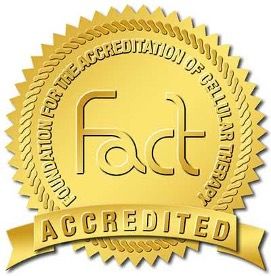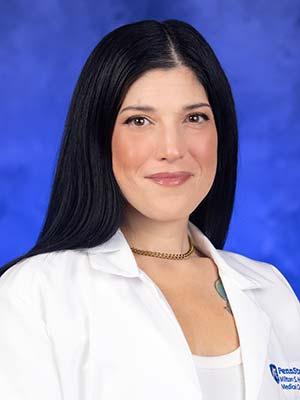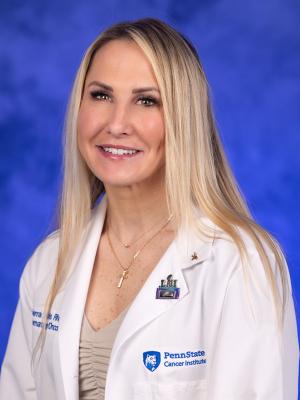What is bone marrow transplantation?
Bone marrow transplantation is a special treatment for individuals with certain types of cancer and noncancerous diseases. It’s also called a bone marrow transplant or a hematopoietic stem cell transplant (HSCT).
Bone marrow helps make blood stem cells, including white blood cells, red blood cells and platelets. Bone marrow transplants replace unhealthy marrow with healthy marrow and are critical for restoring the body’s ability to produce blood cells in individuals with conditions like leukemia, lymphoma and aplastic anemia.
For the estimated 50,000 individuals who receive bone marrow transplants each year, the benefits are significant, potentially eradicating cancer and restoring immune function. At Penn State Cancer Institute, we provide comprehensive care and support throughout the transplant process to ensure the best possible outcomes for our patients.
Treatment
The bone marrow transplant process involves several critical steps to achieve the best result. After a thorough assessment and development of a personalized treatment plan, you may receive chemotherapy and possible radiation to destroy unhealthy cells and prepare your body for new cells. The transplant itself is done through an intravenous (IV) tube, much like a blood transfusion, where healthy stem cells are infused into your bloodstream. These cells travel to the bone marrow and begin producing new, healthy blood cells.
Our experienced team performs 200 to 220 procedures like this each year. We offer the two main types of bone marrow transplantations:
Autologous transplants
Autologous transplants, or autologous HSCTs, use your own blood stem cells for the transplant instead of a donor’s. First, we collect your stem cells. After that, you’ll get high-dose chemotherapy to kill the diseased cells. Then, we give your stem cells back to you through an IV. We may also freeze some of your collected cells in case a future transplant is needed.
Allogeneic transplants
Allogeneic transplants use healthy blood stem cells from someone else. Sometimes stem cells come from a relative. A close match offers a lower risk of side effects and complications after transplant.
Prior to your transplant, you’ll receive conditioning treatments that include chemotherapy and possible radiation. This helps kill cancer cells and suppress your immune system. Suppressing your immune system is important to help your body accept the transplanted blood stem cells.
After the conditioning treatments are complete, we will infuse the donor cells into your bloodstream through an IV. Side effects of allogeneic stem cell transplants may include infections and graft-versus-host disease (GVHD). We will monitor you closely for these side effects.
International accreditation in bone marrow transplantation

Since 1996, the Cancer Institute has performed more than 3,400 stem cell transplants and continues to provide approximately 200 lifesaving stem cell transplants each year. Our stem cell transplant program has earned and maintained accreditation from the International Foundation for the Accreditation of Cellular Therapy (FACT) since 2000.
Accreditation is required to perform stem cell transplants and remain part of the international network of donors that patients depend on for potentially lifesaving procedures for many blood cancers and blood diseases. FACT awards accreditation once every three years.
Organizations voluntarily seek and maintain FACT accreditation through a rigorous process that includes peer-reviewed, on-site inspections. Accreditation ensures that a hospital’s clinical programs and personnel maintain the highest standards of care.
New advances in cellular therapy
Chimeric antigen receptor (CAR) T-cell therapy, or CAR T, is a groundbreaking treatment that uses your body’s own cells to fight certain types of diseases. During the procedure, your doctor will extract several million of your white blood cells, called T cells. A technician then genetically modifies those cells in a lab to fight blood cancer before they are reinfused into your body. The Cancer Institute performed its first CAR T infusion in 2018. Many recipients remain in remission today.
Learn more about CAR T-cell therapy
Risks and complications
While bone marrow transplants can be lifesaving, they do come with risks like infections, bleeding and side effects from anesthesia. Chemotherapy or radiation before the transplant can weaken the immune system, making infections more likely.
Some long-term risks may include graft-versus-host disease (GVHD), where the new cells attack the body (specific to allogeneic transplants), as well as possible organ issues, hormonal changes, infertility or secondary cancers. It’s important to understand these risks when considering a stem cell transplant.
At the Cancer Institute, our expert team carefully monitors you and uses regular check-ups to catch problems early. We focus on safety and provide comprehensive care to reduce risks and support a strong recovery.
Is a bone marrow transplant right for me?
Bone marrow transplants are used when aggressive blood cancers, diseases or genetic disorders have not responded to conventional treatments. It may be used to treat diseases such as:
- Acute leukemia
- Multiple myeloma
- Lymphoma
Your oncologist will decide if a bone and marrow transplant is an effective treatment option for you. They may recommend stem cell transplantation based on your:
- Age
- Past treatment and outcomes
- Personal and family medical history
- Family support system
- Personal motivation to take care of yourself throughout the transplant process
If you have questions or need a referral to Penn State Cancer Institute, call 717-531-6585, option 1.
Related services and treatments
Meet the team
Bone marrow transplant staff

Suchi Patel
Manager, Bone Marrow Transplant

Michelle Bernas-Peterson
Transplant Nurse Coordinator

Jessica Valentin
Transplant Nurse Coordinator

Paige Erbach
Transplant Nurse Coordinator

Melora Hartman
Transplant Nurse Coordinator

Raquel Misas
Transplant Nurse Coordinator

Mitzi Lowe
Hematology Nurse Coordinator

Sierra Snukis
Transplant Coordinator

Allyson Shicora
Hematology Nurse Coordinator

Katie Pennay
Hematology Nurse Coordinator

Natalie DeKryger
Hematology Nurse Coordinator

Jill Nicklaus
Transplant Financial Coordinator

Martha Gelgot
Bone Marrow Transplant Financial Coordinator

Karen Rogers
Outpatient Social Worker

Makeba Cameron
Outpatient Social Worker

Heather Kinsey
Licensed Practical Nurse

Heidi Vinson
Bone Marrow Transplant Quality Manager

Denise Bartram
Bone Marrow Transplant Data Manager

Brooke Silar
Bone Marrow Transplant Data Manager

Caitlin Vajdic
Bone Marrow Transplant Data Manager
Support Groups
Support groups provide an opportunity to share your feelings and connect with other patients and caregivers who are experiencing similar struggles.














